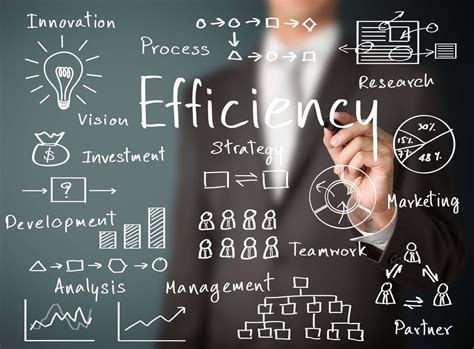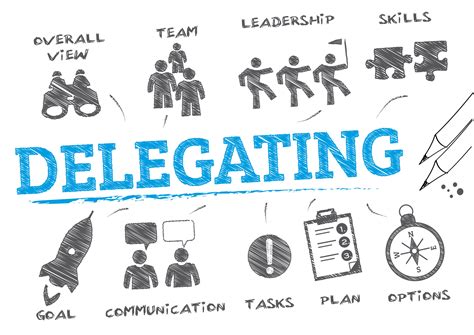Achieving success in today's fast-paced world requires more than just knowledge and skills. It demands the ability to effectively manage your time and make the most out of every second. Efficient time management is an invaluable skill that can significantly enhance your productivity, reduce stress, and help you achieve your goals.
In a world where distractions abound and time seems to slip through our fingers, developing strong time management skills is paramount. Whether you are a student striving to juggle multiple assignments, a professional aiming to meet deadlines, or simply someone looking to better organize your daily tasks, these strategies will empower you to take control of your time and make the most of every moment.
Creating structure and prioritizing tasks are vital elements of effective time management. By setting clear goals and establishing a plan, you can streamline your efforts and focus on what truly matters. Learning how to identify priorities, differentiate between urgent and important tasks, and allocate your time accordingly will allow you to work more productively and achieve greater results.
Mastering the Art of Optimizing Your Time Efficiency

In today's fast-paced world, it is crucial to enhance your ability to effectively allocate and utilize your time. By improving your skill set in managing time, you can unlock your maximum productivity potential. In this section, we delve into valuable techniques and strategies to optimize your time efficiency, enabling you to accomplish more tasks in less time.
1. Prioritize Like a Pro
One of the key aspects of efficient time management is prioritization. By identifying and focusing on the most important tasks, you ensure that you dedicate your time towards significant and impactful undertakings. Analyze your to-do list, consider the urgency and importance of each task, and assign clear priorities.
2. Master the Art of Delegation
Recognizing the value of delegation is essential for efficient time management. Delegating tasks that can be handled by others helps free up your own time to concentrate on critical responsibilities. Delegate wisely by assessing the skills and capabilities of your team, and assign tasks accordingly.
3. Eliminate Time-Wasting Activities
To maximize your time efficiency, it is crucial to identify and eliminate time-wasting activities. Evaluate your daily routines and identify tasks or habits that do not contribute significantly to your goals. This could include excessive social media usage, unnecessary meetings, or excessive multitasking. Focus on eliminating or reducing such activities to reclaim valuable time.
4. Embrace the Power of Planning
A well-organized and structured plan can greatly enhance your time management skills. Take the time to create a detailed schedule or a to-do list, including specific time slots for each task. This not only provides a clear roadmap of your day but also helps you stay focused and motivated, ensuring optimal use of your time.
5. Harness the Benefits of Time Blocking
Time blocking is a powerful technique that involves allocating specific periods of time for distinct tasks or activities. This method helps minimize distractions and enables you to fully immerse yourself in each task without interruptions. Experiment with time blocking and discover how it can revolutionize your time management efficiency.
6. Cultivate Effective Stress Management Techniques
High levels of stress can significantly hinder your ability to manage time effectively. Prioritize self-care and adopt stress management techniques such as exercise, meditation, or journaling. By maintaining a healthy state of mind, you increase your focus, productivity, and overall efficiency in managing your time.
Remember, effective time management skills are an invaluable asset in achieving your goals and attaining success. By implementing these techniques and strategies into your routine, you can master the art of optimizing your time efficiency and unlock your full potential.
Prioritize Your Tasks Wisely
When it comes to making the most of your time and being productive, it is crucial to prioritize your tasks wisely. This means determining which tasks are most important and deserve your immediate attention, as well as identifying those that can be delegated or postponed. By prioritizing your tasks effectively, you can ensure that you are focusing your time and energy on the activities that will yield the greatest results.
- Identify urgent tasks: Begin by identifying the tasks that have impending deadlines or require immediate action. These are the tasks that cannot be delayed and should be given high priority.
- Evaluate importance: Once you have identified the urgent tasks, it is important to evaluate their importance. Consider the impact that each task has on your goals, projects, or overall productivity. Assign higher priority to tasks that align more closely with your long-term objectives.
- Create a task list: Create a comprehensive task list that includes all the tasks you need to complete. This list will serve as a visual representation of your workload and help you prioritize effectively.
- Use time-blocking techniques: Time-blocking involves allocating specific time slots to different tasks or activities. By assigning dedicated time for each task, you can ensure that you have sufficient time to complete the important ones without getting overwhelmed.
- Consider your energy levels: Take into account your energy levels throughout the day when prioritizing tasks. Allocate your high-energy periods for tackling complex or demanding tasks, and use low-energy periods for more routine or less critical tasks.
- Delegate or eliminate tasks: Learn to delegate tasks that can be done by others, freeing up your time for more important responsibilities. Similarly, eliminate tasks that are unnecessary or do not contribute significantly to your goals or productivity.
- Review and adjust priorities: Regularly review and adjust your task priorities as needed. Circumstances may change, new tasks may arise, or some tasks may become less urgent or important. Stay flexible and adaptable to ensure that your time is always allocated to the most crucial activities.
Prioritizing your tasks wisely is a skill that can significantly enhance your time management abilities. By focusing on what truly matters and organizing your workload effectively, you can increase your productivity and achieve your goals more efficiently.
Setting Clear Objectives and Deadlines

Setting clear goals and establishing deadlines is a fundamental aspect of effective time management. By defining specific objectives and establishing a timeframe to achieve them, individuals can increase their productivity, stay focused, and prioritize their tasks.
Setting clear objectives is crucial because it provides a sense of direction and purpose. Having a clear vision of what needs to be accomplished allows individuals to efficiently allocate their time and efforts towards tasks that contribute to their overall goals and ambitions. By clearly defining objectives, individuals can avoid wasting time on activities that do not align with their long-term aspirations.
Establishing deadlines is equally important as it creates a sense of urgency and helps individuals stay on track. Deadlines act as motivators and encourage individuals to complete tasks within a specific timeframe, preventing procrastination and fostering a proactive attitude. Moreover, setting deadlines enables individuals to realistically manage their workload and allocate appropriate time and resources to each task, preventing overwhelm and ensuring that goals are achieved in a timely manner.
In conclusion, setting clear objectives and deadlines is an essential aspect of effective time management. By clearly defining goals and establishing a timeframe, individuals can prioritize their tasks, increase productivity, and stay focused on what truly matters. This practice not only helps individuals achieve their objectives efficiently but also enhances their overall efficiency and well-being.
Eliminate Distractions and Maintain Focus
In order to effectively manage your time, it is crucial to minimize any elements that divert your attention and stay concentrated on the task at hand. Eliminating distractions allows you to optimize productivity and accomplish your goals efficiently.
Avoiding interruptions: Distractions can come in various forms, such as social media notifications, phone calls, or colleagues seeking your attention. It is important to set boundaries and establish a dedicated work environment where interruptions can be minimized. By turning off phone notifications, closing irrelevant tabs on your computer, and communicating your availability to colleagues, you can create a focused atmosphere conducive to enhanced time management.
Implementing time blocks: Allocating specific time blocks for different tasks enables you to concentrate solely on the task at hand. By creating a structured schedule and adhering to it diligently, you can avoid becoming overwhelmed by multiple responsibilities. Time blocking helps to maintain focus and motivates you to complete tasks within set time frames, thereby increasing efficiency and productivity.
Utilizing productivity tools: There are numerous tools and applications available that can assist you in eliminating distractions and improving time management skills. For instance, using website blockers or apps that track and limit your time spent on social media platforms can help you stay focused. Additionally, productivity apps and task management tools can aid in organizing your tasks and prioritizing your workload effectively.
Cultivating a conducive environment: Creating an environment that promotes concentration plays a significant role in time management. Minimize visual and auditory distractions by decluttering your workspace, using noise-canceling headphones, or playing soft background music. Additionally, incorporating plants or natural elements into your workspace can enhance focus and productivity.
Practicing mindfulness: Developing self-awareness and mindfulness techniques can help you stay focused and eliminate distractions. Engaging in activities such as meditation, deep breathing exercises, or taking short breaks to relax and clear your mind can rejuvenate your focus and improve your overall time management abilities.
By implementing these strategies, you can eliminate distractions and cultivate a focused mindset, leading to enhanced time management skills and increased productivity. Remember, it is important to consistently practice and adapt these techniques to your specific needs in order to achieve optimal results.
Delegate and Learn to Say No

In the realm of efficient time utilization, the ability to delegate tasks and assertively decline additional responsibilities plays a crucial role. By entrusting certain tasks to capable individuals, you free up your own time to focus on priorities and important obligations. Learning to say no to tasks that do not align with your goals and priorities allows you to maintain a balanced workload and avoid spreading yourself too thin.
| Delegate | Learn to Say No |
|---|---|
| Assign tasks to capable individuals | Politely decline tasks |
| Empower others to contribute | Focus on important obligations |
| Free up your own time | Maintain a balanced workload |
| Utilize the skills and strengths of others | Avoid spreading yourself too thin |
Delegating tasks involves assessing the capabilities and strengths of individuals in your team or organization and assigning appropriate responsibilities. By empowering others to contribute and utilizing their skills effectively, you not only free up your own time but also foster a sense of ownership and teamwork among team members. This results in increased productivity and efficiency.
Saying no can be challenging, especially when faced with requests from colleagues, friends, or family members. However, it is essential to recognize that prioritizing tasks and responsibilities is key to effective time management. Politely declining tasks that do not align with your goals or current workload allows you to maintain focus on your important obligations, prevent burnout, and avoid overloading yourself.
Learning to delegate and say no may require some practice and assertiveness, but these skills are invaluable for effective time management. By distributing tasks strategically and setting boundaries, you can maximize your productivity, reduce stress levels, and achieve a healthier work-life balance.
FAQ
How can I improve my time management skills?
There are several ways to improve time management skills. First, you can start by identifying your goals and priorities. This will help you understand what tasks are most important and need your immediate attention. Additionally, creating a daily or weekly to-do list can help you stay organized and focused. Another tip is to prioritize tasks by urgency and importance, allowing you to allocate your time effectively. Lastly, learning to delegate tasks and say no when necessary can also help you manage your time better.
What are some common time-wasting activities that I should avoid?
There are several common time-wasting activities that you should avoid to improve your time management skills. These include excessive use of social media, constantly checking emails or notifications, procrastinating, multitasking, and engaging in unproductive conversations. By eliminating or minimizing these activities, you can free up more time and focus on tasks that truly matter.
Is it beneficial to take breaks during work to improve productivity?
Yes, taking breaks during work can actually improve productivity. Studies have shown that short breaks, such as quick walks or relaxation exercises, can help rejuvenate the mind and prevent burnout. These breaks allow you to recharge, refocus, and come back to work with a fresh perspective. However, it's essential to ensure that these breaks are not too long or frequent, as they can become counterproductive.
How can I handle distractions and stay focused on my tasks?
To handle distractions and stay focused on tasks, you can employ several strategies. First, try to create a dedicated workspace that is free from distractions. This means turning off notifications on your phone or computer, closing irrelevant tabs or apps, and informing others of your need for uninterrupted work time. Additionally, practicing mindfulness techniques, such as deep breathing or meditation, can help increase your ability to concentrate and stay focused amidst distractions.
What are the benefits of effective time management?
Effective time management provides numerous benefits. Firstly, it allows you to prioritize tasks and allocate time accordingly, ensuring that important and urgent tasks are completed in a timely manner. This leads to reduced stress and increased productivity. Additionally, good time management skills help create a better work-life balance, allowing you to have more time for leisure activities, hobbies, and personal relationships. It also helps improve decision-making and prevents the feeling of being overwhelmed by tasks and deadlines.
What are some effective time management skills?
Effective time management skills include prioritizing tasks, setting goals, creating a schedule, eliminating distractions, and practicing focus techniques.
How can I prioritize my tasks effectively?
You can prioritize tasks effectively by determining their importance and urgency, using to-do lists or task management apps, and focusing on completing high-priority tasks first.



